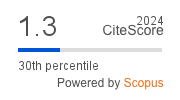The correlation between the knowledge level related to practice protocols and dentists' anxiety levels in practice during the COVID-19 pandemic
Downloads
Background: The global epidemic of COVID-19 has reached an emergency status in the health system, including dentistry. The dentist profession is inseparable from the possibility of direct or indirect contact with microorganisms in the patient's blood or saliva. National and international dental associations, such as Persatuan Dokter Gigi Indonesia and the American Dental Association, have published practice protocols that must be applied by dentists who choose to continue practicing during the COVID-19 pandemic. Dentists' knowledge of practice protocols in the current situation is very important, as it enables dentists to take infection control measures against virus transmission in the dental practice environment. Strong knowledge can have a positive impact on the psychological state of dentists, such as by reducing the anxiety level of dentists when treating patients during the pandemic. Purpose: To determine the correlation between the level of knowledge of dentists regarding practice protocols and the level of anxiety that they face regarding practicing during the COVID-19 pandemic in Indonesia. Methods: The research design is a correlation analysis, namely research with a cross-sectional approach and purposive sampling, with a total sample of 170 respondents. Data were collected through Google form and univariate analysis was carried out then bivariate analysis with Kendall's Tau correlation test. Results: This study found that as many as 166 respondents (97.6%) had a good level of knowledge and as many as 87 respondents (51.2%) had a minimum level of anxiety. The results of the analysis were obtained and found to be 0.031, which means p <0.05 so that it shows a relationship between the two variables. Conclusion: There is a correlation between the level of knowledge and the level of anxiety of dentists in practice during the COVID-19 pandemic.
Downloads
Kamate S, Sharma S, Thakar S, Srivastava D, Sengupta K, Hadi AJ, Chaudhary A, Joshi R, Dhanker K. Assessing knowledge, attitudes and practices of dental practitioners regarding the COVID-19 pandemic: A multinational study. Dent Med Probl. 2020; 57(1): 11–7. doi: https://doi.org/10.17219/dmp/119743
Consolo U, Bellini P, Bencivenni D, Iani C, Checchi V. Epidemiological aspects and psychological reactions to COVID-19 of dental practitioners in the Northern Italy Districts of Modena and Reggio Emilia. Int J Environ Res Public Health. 2020; 17(10): 3459. doi: https://doi.org/10.3390/ijerph17103459
Ahmed MA, Jouhar R, Ahmed N, Adnan S, Aftab M, Zafar MS, Khurshid Z. Fear and practice modifications among dentists to combat Novel Coronavirus Disease (COVID-19) outbreak. Int J Environ Res Public Health. 2020; 17(8): 2821. doi: https://doi.org/10.3390/ijerph17082821
Niedderer K. Mapping the meaning of knowledge in design research. Des Res Q. 2007; 2(2): 1, 5–13. web: http://hdl.handle.net/2436/38736
Utami F, Putri KS, Hidayati H. Hubungan pengetahuan dan sikap dengan tindakan mahasiswa program profesi dokter gigi RSGMP Universitas Andalas terhadap pengendalian infeksi. Andalas Dent J. 2017; 5(2): 88–98. doi: https://doi.org/10.25077/adj.v5i2.74
Julistia R, Sari K, Sulistyani A. Perbedaan tingkat kecemasan pada dokter gigi muda dan perawat gigi muda saat menghadapi pasien. J Psikogenes. 2018; 4(1): 73–84. doi: https://doi.org/10.24854/jps.v4i1.519
Aly MM, Elchaghaby MA. Impact of novel coronavirus disease (COVID-19) on Egyptian dentists' fear and dental practice (a cross-sectional survey). BDJ Open. 2020; 6(1): 19. doi: https://doi.org/10.1038/s41405-020-00047-0
Annisa DF, Ifdil I. Konsep kecemasan (Anxiety) pada lanjut usia (Lansia). Konselor. 2016; 5(2): 93. doi: https://doi.org/10.24036/02016526480-0-00
Olivieri JG, de España C, Encinas M, Ruiz X-F, Miró Q, Ortega-Martinez J, Durán-Sindreu F. General anxiety in dental staff and hemodynamic changes over endodontists' workday during the Coronavirus Disease 2019 pandemic: A prospective longitudinal study. J Endod. 2021; 47(2): 196–203. doi: https://doi.org/10.1016/j.joen.2020.10.023
Lai J, Ma S, Wang Y, Cai Z, Hu J, Wei N, Wu J, Du H, Chen T, Li R, Tan H, Kang L, Yao L, Huang M, Wang H, Wang G, Liu Z, Hu S. Factors associated with mental health outcomes among health care workers exposed to Coronavirus Disease 2019. JAMA Netw Open. 2020; 3(3): e203976. doi: https://doi.org/10.1001/jamanetworkopen.2020.3976
Kinariwala N, Samaranayake LP, Perera I, Patel Z. Concerns and fears of Indian dentists on professional practice during the coronavirus disease 2019 (COVID"19) pandemic. Oral Dis. 2021; 27(S3): 730–2. doi: https://doi.org/10.1111/odi.13459
Persatuan Dokter Gigi Indonesia. Surat edaran No.2776/PB PDGI/III-3/2020 tentang pedoman pelayanan kedokteran gigi selama pandemi virus Covid-19. 2020. p. 1–13. Available from: http://pdgi.or.id/artikel/pedoman-pelayanan-kedokteran-gigi-selama-pandemi-virus-covid-19. Accessed 2020 Sep 22.
Baker A, Simon N, Keshaviah A, Farabaugh A, Deckersbach T, Worthington JJ, Hoge E, Fava M, Pollack MP. Anxiety symptoms questionnaire (ASQ): development and validation. Gen Psychiatry. 2019; 32(6): e100144. doi: https://doi.org/10.1136/gpsych-2019-100144
Zhao S, Cao J, Sun R, Zhang L, Liu B. Analysis of anxiety-related factors amongst frontline dental staff during the COVID-19 pandemic in Yichang, China. BMC Oral Health. 2020; 20(1): 342. doi: https://doi.org/10.1186/s12903-020-01335-9
Bakaeen LG, Masri R, AlTarawneh S, Garcia LT, AlHadidi A, Khamis AH, Hamdan AM, Baqain ZH. Dentists' knowledge, attitudes, and professional behavior toward the COVID-19 pandemic. J Am Dent Assoc. 2021; 152(1): 16–24. doi: https://doi.org/10.1016/j.adaj.2020.09.022
Koçak S, SaÄ¡lam BC, Özdemir O, Hazar E, Koçak MM. Knowledge and anxiety level of dentists about COVID-19 pandemic. J Oral Heal Community Dent. 2021; 14(3): 104–9. doi: https://doi.org/10.5005/jp-journals-10062-0084
Copyright (c) 2022 Dental Journal (Majalah Kedokteran Gigi)

This work is licensed under a Creative Commons Attribution-NonCommercial-ShareAlike 4.0 International License.
- Every manuscript submitted to must observe the policy and terms set by the Dental Journal (Majalah Kedokteran Gigi).
- Publication rights to manuscript content published by the Dental Journal (Majalah Kedokteran Gigi) is owned by the journal with the consent and approval of the author(s) concerned.
- Full texts of electronically published manuscripts can be accessed free of charge and used according to the license shown below.
- The Dental Journal (Majalah Kedokteran Gigi) is licensed under a Creative Commons Attribution-ShareAlike 4.0 International License

















